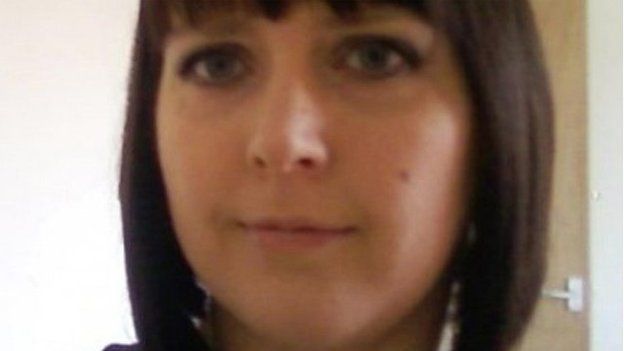'Clare's Law' introduced to tackle domestic violence
- Published
- comments

A scheme to let people find out from police if their partner has a history of domestic violence has been brought in across England and Wales.
The Domestic Violence Disclosure Scheme - known as Clare's Law - is intended to provide information that could protect someone from being a victim of attack.
The initiative is named after 36-year-old Clare Wood who was murdered by her ex-boyfriend in 2009.
Home Secretary Theresa May said abuse by partners should not be tolerated.
Jane Keeper from Refuge and Assistant Chief Constable Louisa Rolfe discuss Clare's Law
'Life-saving information'
The scheme allows the police to disclose information on request about a partner's previous history of domestic violence or violent acts.
It has been introduced to coincide with International Women's Day, following pilot schemes in four areas - Greater Manchester, Gwent, Nottinghamshire and Wiltshire - since September 2012.
The Home Office said the pilots had provided more than 100 people with potentially life-saving information.
Ms Wood was strangled and set on fire at her home in Salford, Greater Manchester, in February 2009 by George Appleton, who had a record of violence against women.
Her father, Michael Brown, who campaigned for the introduction of Clare's Law, is convinced she would still be alive had she known the full extent of Appleton's previous behaviour.
He said he was "absolutely delighted" that the scheme had come into force.
Mr Brown, a retired prison officer from Batley, West Yorkshire, spearheaded the "right to know" campaign after his daughter's death.
"I must admit it's tinged with a bit of emotion and a bit of sadness but we have got what we were fighting for - to bring protection into the country for half the population," he said.
New powers to protect victims in the immediate aftermath of an incident of domestic violence have been introduced alongside Clare's Law.
Magistrates can grant Domestic Violence Protection Orders (DVPOs) preventing perpetrators from contacting victims for up to 28 days.
They were trialled in Greater Manchester, West Mercia and Wiltshire.
'Stay or not'
Home Secretary Theresa May told the BBC: "Clare's Law will give some help to those people who think they have a partner who may be acting in a way which suggests that they are somebody who is violent.
"It enables that individual then to go to the police and they've got the right to ask for information about that partner. The police obviously have to think about that carefully, what information they give to the individual, and the support needs to be there for them," Ms May said.
"But it enables somebody to know whether their partner has a record of violence, and to be able to take a decision as to whether to stay with them or not."
She said 76 women were killed at the hands of a partner or ex-partner last year.
Crime prevention minister Norman Baker said nearly £40m had been ring-fenced for local support services and national helplines dealing with domestic violence.
'Facebook Fugitive'
But Jane Keeper from domestic violence charity Refuge said the law would do very little as it was targeting the wrong problem.
"Most perpetrators of domestic violence are never known to police, social care or the other agencies - so usually if a woman asks the police the likeliest thing, even if he is a perpetrator, is they are not going to know anything.
"The real problem is women we are working with right this minute, every day, experience really shocking failures on the part of the police and other state agencies."
Ms Wood, a mother-of-one, had met Appleton on Facebook.
She knew nothing about his history of violence against women, which included threats, repeated harassment and the kidnapping at knifepoint of one of his ex-girlfriends.
He went on the run after murdering Ms Wood and was dubbed the "Facebook Fugitive". He hanged himself while still at large.
Mr Brown urged women to make the most of the new scheme.
He said: "I can remember standing outside the coroner's office feeling lost. I'd lost a daughter and I thought I'd lost the battle.
"I wish I'd known what I know now because I felt desolate and for the pendulum to swing so far around, that has put a smile back on my face, it's hardly worth believing.
"It's there to be used. Get it used, ask! If you are in a domestic violence situation or you think you could be seek advice and get out of there, because the ultimate is 120 women a year have lost their lives, mostly at a young age."
- Published29 August 2013
- Published25 November 2013
- Published23 May 2011
- Published3 December 2013